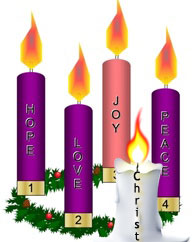The word Advent, as derived from the Latin word adventus, means “coming” or “arrival.” Adventus is in turn the Latin translation of the Greek word parousia, meaning “presence” and commonly used to refer to the Second Coming of Christ.
During Advent we are summoned to recall the history of God’s people and reflect on how the prophecies and promises of the Old Testament in the Bible were fulfilled by the birth of Jesus Christ. The Gospels of Saint Matthew and Saint Luke opt for Bethlehem, while Saint Mark and Saint John seem to lean more toward Nazareth as the birthplace of Christ.
As for the year, month or day of Jesus’ birth, you can likely rule out Dec. 25 for either of the latter two but perhaps settle on sometime between 7BC and 4BC for the year. Pope-emeritus Benedict XVI, in his book, Jesus of Nazareth: The Infancy Narratives, published in November 2012, wrote Jesus was born several years earlier than commonly believed because the entire Christian calendar is based on a miscalculation by a sixth century monk known as Dionysius Exiguus, or in English, Dennis the Small.
Advent is the beginning of the Western liturgical year and commences on Advent Sunday, Nov. 30 this year, running through Christmas Eve.
In the Advent Wreath, the Prophet’s Candle symbolizes hope; the Bethlehem Candle symbolizes faith; the Shepherd’s Candle symbolizes joy and the Angel’s Candle symbolizes peace.
“The historical origins of Advent,” which began this year Nov. 30, “are hard to determine with great precision,” Father William Saunders, dean of the Notre Dame Graduate School of Christendom College in Alexandria, Virginia, has written. “In its earliest form, beginning in France, Advent was a period of preparation for the Feast of the Epiphany, a day when converts were baptized; so the Advent preparation was very similar to Lent with an emphasis on prayer and fasting which lasted three weeks and later was expanded to 40 days.
“In 380, the local Council of Saragossa, Spain, established a three-week fast before Epiphany. Inspired by the Lenten regulations, the local Council of Macon, France, in 581 designated that from Nov. 11 (the Feast of St. Martin of Tours) until Christmas fasting would be required on Monday, Wednesday, and Friday. Eventually, similar practices spread to England. In Rome, the Advent preparation did not appear until the sixth century, and was viewed as a preparation for Christmas with less of a penitential bent.”
The Anglican Church of Canada produces a worthwhile Advent series annually in podcast format. This year’s effort is called “Sealed in the Same Spirit” and was offered in Edmonton last August by a special delegation from the Episcopal Church of Cuba, and produced by the Anglican Church of Canada. The first brief two-minute-and-34-second podcast can be heard here at http://15e51a4c89abec992ec0-2c07a39145fe51fb75e38d44722ddba4.r44.cf2.rackcdn.com/2014-01.mp3
Also worth another listen to this Advent is “In Days to Come,” the first in a series of six podcasts for last year’s season of Advent, produced by Winnipeg’s Signpost Music and Saint Benedict’s Table (named after St. Benedict of Nursia, the sixth century Italian monk who founded western monasticism).
The first 2013 Advent episode, again produced for the Anglican Church of Canada, featured Jamie Howison, an Anglican priest, who is the pastoral leader of Saint Benedict’s Table, talking about the medieval practice of contemplating “the four last things” – death, judgment, hell and heaven, bringing the peace, joy, hope and love of the Advent wreath (borrowed by the rest of us from German Lutherans in the 16th century) into sharper relief in the context of the Matthean Judgment, the name used for the parable of the sheep and the goats in Matthew 25. You can listen to the episode here: http://6ea032789d8200a5f5e1-53f66bb87b41c0fa2b150aea4f98a852.r94.cf2.rackcdn.com/2013-01.mp3
“Judgment, it would seem,” said Howison, “rides on these very basic human matters of compassion in action as a preacher, I really have to acknowledge the goatiness of my own day-to-day life. Reading this particular parable, I’m not sure I’d fare all that well on the day when the Son of Man comes in his glory.”
Howison, the founding pastor of Saint Benedict’s Table in Winnipeg, is a graduate of the University of Winnipeg and of Trinity College, an Anglican college at the University of Toronto, and has worked in ordained ministry since 1987, serving in parish ministry, as pastoral care co-ordinator at Marymound – a treatment centre for adolescent girls. Marymound got its starts in April 1911 when five Roman Catholic Sisters of the Good Shepherd came to Winnipeg at the invitation of juvenile court Judge Thomas Daly, who was seeking an alternative to prison for young women and girls he encountered in his court. St. Mary Euphrasia Pelletier had founded the Congregation of the Sisters of the Good Shepherd in Angers, France in 1835. She was canonized a saint on May 2, 1940 by Pope Pius XII.
Howison also has served as chaplain and dean of residence at St. John’s College, an Anglican college on the University of Manitoba campus in Winnipeg. He has ministered full-time with Saint Benedict’s Table since the autumn of 2004.
From 2004 through 2010, Howison served as a member of the Primate’s Theological Commission of the Anglican Church of Canada. In the winter of 2011, he spent a month as scholar-in-residence at the Burke Library of Union Theological Seminary in New York, the oldest independent, ecumenical, Christian seminary in the United States, and another month as a resident scholar at the Catholic Benedictine Collegeville Institute at St John’s Abbey in Collegeville, Minnesota, during which time he wrote on the theological vision of the jazz musician John Coltrane.
Signpost Music, which co-produced the “In Days to Come” Advent podcasts, is the creation of Steve Bell, the 54-year-old Juno-winning singer-songwriter, and his business partner and manager, Dave Zeglinski.
Howison and Bell have also written a fair bit of music together, including “Hear Our Prayer,” off Bell’s 1992 album Deep Calls to Deep.



